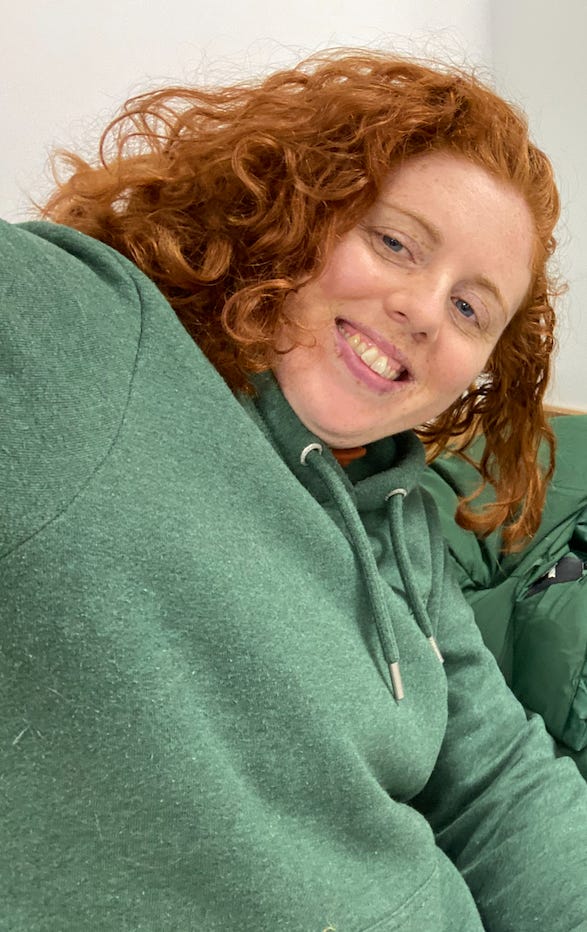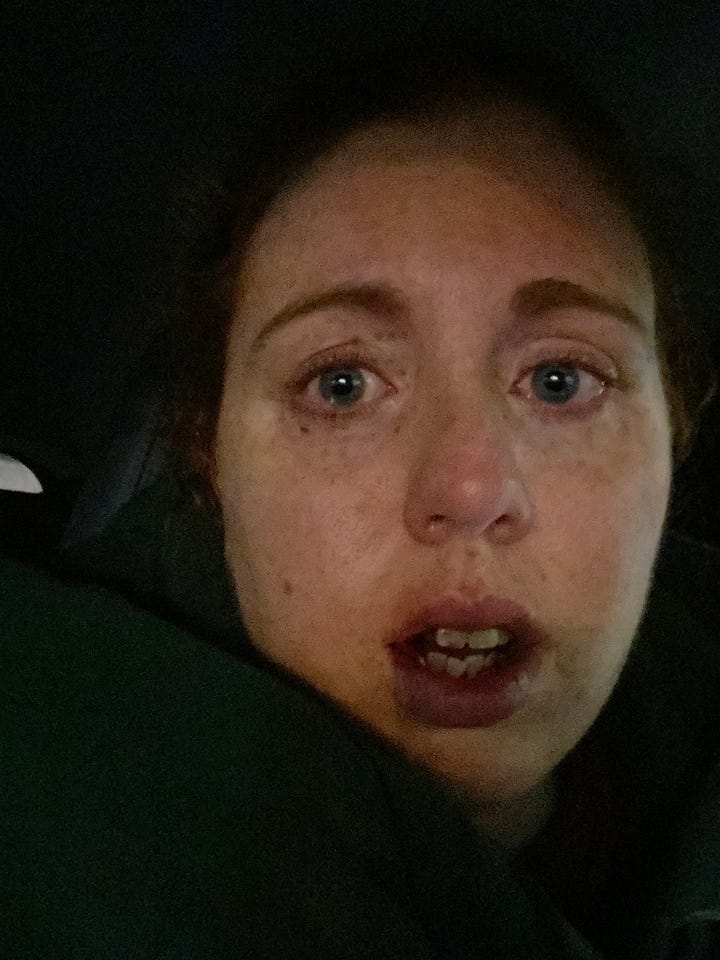Welcome back to Beyond Survival, a publication about life after trauma. Thank you for sticking with me through my mini-creative sabbatical. I needed it. Today, I’m back with an essay about medical trauma. As always if you’re feeling a bit sensitive today, please feel free to skip it.
I’ve had a rough start to the year. After an emergency doctor's appointment on Christmas eve, I spent Christmas day on the couch using AI Gywneth Paltrow to communicate because I was completely hoarse. My partner requested Charlize Theron but sadly she wasn’t available! We canceled our trip to Rome, and went to the vet every second day with a very weak cat who was refusing to eat or drink. I finished my antibiotics between Christmas and New Years and within a few days, developed a niggling toothache. It got worse and worse til the damn thing had to come out.
It was a horrible, violent procedure not helped by the unsympathetic dentist who was more interested in telling me about the woman vomiting blood due to an accidental paracetamol overdose than answering my questions about pain management. “Just push through it” has to be among the least helpful sentences ever uttered.
What this dentist (& so many other medical people I’ve interacted with) didn’t know was that this body - my body - has already been through a lot. Childhood sexual abuse, a very sudden bereavement, countless mild to moderate illnesses, a surgery during Covid and a half dozen other procedures to accompany it and a serious mental health condiction.
When something is labeled a mental illness, it’s easy to forget the devastating physical symptoms that accompany it. It’s not just that you feel low. It’s that you can’t physically move your limbs. It’s not just that you feel scared. It’s that your body is at such high alert that it could fight off an intruder. Mental illnesses show up in the body. They show up as feeling too nauseous to eat and too restless to sleep. The echoing emptiness of sharp, sudden grief is one of my strongest memories from the years after my mother died. How my body felt newly hollow and adrift in a world she didn’t inhabit.
These things accrue in the body. They linger in my cells. Not just in a felt, lived experience way but in ways that scientists can measure and track. Serious trauma changes our DNA. It changes how our bodies work at a cellular level.
I’ve seen dozens of medical professionals in my life, and I don’t think I could describe any of them as trauma-informed. I’ve had some positive experiences particularly the nurses who cared for me after I had surgery in March 2021. But that care wasn’t informed by the knowledge that they were caring for a body that had been split open by sexual abuse as a young child, and had just been re-opened by a surgeon’s scalpel. It was abdominal surgery to address a kidney issue that had been dormant in my body since childhood, but the body doesn’t discriminate. When there is a breach on its borders, it knows only how to scramble its defenses and try to defend its territory.
When the dentist pierced my tender gums with a needle full of numbing agent (“a little scratch,” apparently), she didn’t consider how my body would respond. She didn’t know my heart was pounding. Or that I was sweating. She didn’t know how scared I was, and how silly I felt to be scared of the dentist at 36. She didn’t know that panic had been brewing in me for the 35 minutes she left me sitting in the waiting room, while she wandered around and chatted with the receptionist. She didn’t know how frightening it was to be handed an indemnity form listing all the things that could go wrong and be asked to sign it without having anyone to discuss it with. She didn’t know how unsettling it was to pay before the procedure - €450 in the days just after I promised myself I’d try to save more money this year.
She never asked if I was OK. She chattered away, asking questions I couldn’t answer because my mouth was full of instruments and telling me to move to another room for an x-ray. Is that really necessary? I had an x-ray 3 days ago at my first appointment, and don’t they cause cancer? I didn’t ask those questions because I didn’t want to cause trouble. And also because my mouth felt numb and strange and I was trying to focus on staying calm and following her instructions.
Medical people1 are rarely taught to consider the trauma contained in the bodies they treat. They have checklists for empathy, and are trained to be non-judgemental but they are rarely trauma- informed. They’re not taught to consider the patient’s vulnerability, how they have been worn down by days and nights of relentless agony and no sleep. They’re not taught to consider how disorientating it is to be told that the previous dentist was wrong and their advice could have poisoned me.
It was all too much. I left the dentist’s office and cried in the waiting room. My partner comforted me and helped me sort through what I should do next. I elected to go back in. To go through a horrible procedure in the hope that it would ease my pain. It did, but it cost me.


I’ve been through enough trauma to know the way out. I know how to soothe my body after it has been triggered. I followed my usual prescription: time, rest, reading, writing and as much crying as I needed. There was a lot of crying, but it was necessary. Crying cleanses. It allows emotion to (at least temporarily) pass through the body.
I got a little stronger each day. I managed a walk. A few minutes on my yoga mat. A few hours without crying.
But trauma lingers. For weeks, my body was wound tight and unforgiving, a reaction that is less about a crappy dentist and a violent procedure in an intimate part of the body, and more about all the other trauma that lives in my cells.
But I’m still alive. That’s always the mantra post-trauma. It didn’t kill me. I’m still here.
If you enjoyed this post, please share it with a friend. It helps spread the word about Beyond Survival’s mission.
✍️ Beyond Survival is written by me, Clare Egan, an award-winning writer and journalist. You can read more about me here, or look at some pretty pictures over here. 👋 Click reply to say hello anytime. Thank you for being here!
I can’t call them “professionals”. Is there a better term?






This was helpful, thank you.
I'm so sorry you had to experience that. (and I'm glad the cat is better!!)
Ugh, that is nightmarish. I'm so sorry! Dental procedures themselves can feel/be traumatizing, even without a triggering past.